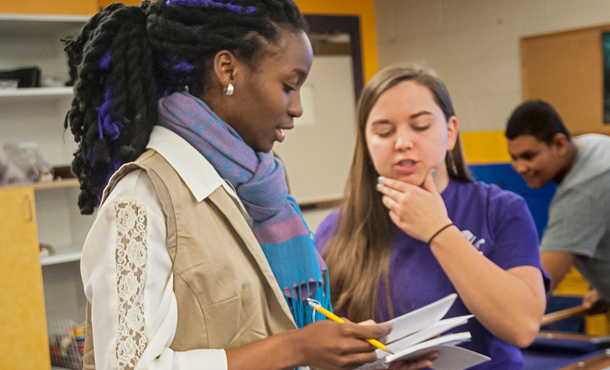Some children can struggle to channel their frustrations effectively, but a local program is trying to change that. The agape-satyagraha internship, a partnership between the Boys & Girls Clubs of Harrisonburg-Rockingham County and Eastern Mennonite University, teaches teenagers nonviolent conflict resolution in a safe setting.
Every week, interns – or “mentors” – from EMU and James Madison University meet with kids at the Boys & Girls’ Teen Center at the Lucy F. Simms Continuing Education Center. The program uses group discussions and the occasional field trip to encourage peaceful communication.
Fifteen to 20 teens are participating in the program this year and most mentors do the program for a single semester. One exception is Jodie Geddes, an EMU graduate student, who is returning this spring.
“I love hearing their stories and how they begin to open up to you after just a few days,” Geddes said. “Also hearing them talk about the things that they love.”
Geddes thinks the youth she works with are “really incredible.” They range from 13 to 17 years old and have come to communicate more during group discussions.
Agape-satyagraha was developed by One Earth Peace, a Maryland-based leadership training organization that partners with the Church of the Brethren, and came to the Boys & Girls Club two years ago. EMU began its partnership last year.
Agape translates from classical Greek as “love,” and is referred to in the Bible as selfless devotion or charity. Satyagraha is the philosophy of passive resistance, popularized by Mohandas Gandhi.
The program has religious and secular curricula that interns can use, although Geddes said she works with the latter version.
“The good thing about this program is it’s very malleable,” said Geddes, who is pursuing a master’s in conflict transformation and wants to work with restorative justice in schools.
“We’ve been talking about how we can be nice to each other,” said Harrisonburg High School student Carlos Moyet, 14, who joined the program last year with his 12-year-old brother.
Most participants are enrolled in public schools and do not need to formally register for the program.
“What I learned in agape was don’t hate, and appreciate and love,” said Elijah Pinedo, 12, a Thomas Harrison Middle School student. “Don’t try to use violence … try to use words.”
Geddes admitted that asking teenagers to talk about concepts like “anger queues” and respectful disagreement does not always come naturally.
She also acknowledged that not all cultures view nonviolence as acceptable in every situation.
“How do I allow the youth to tell their own stories and also feel comfortable saying, `Miss Jodie, I don’t agree with you,'” is something she said she asks herself.
Originally from Jamaica, Geddes has worked previously with refugees, experience she said that helps her connect with students who either are immigrants or whose parents are.
Courtesy of the Daily News Record, Jan. 19, 2015
